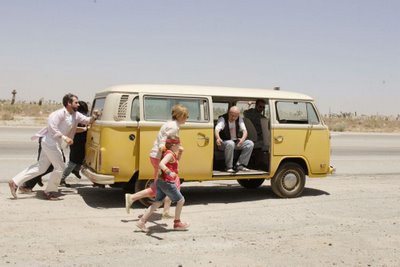

I finally saw Little Miss Sunshine last night and liked is as much as everyone else did. I had a special fondness for what happens to the family, where things start bad (picture 1) and get much better - I'll explain how (picture 2). The father, Richard (top picture, shirt and tie), is trying to make it as a self-improvement guru by selling his 9 -steps to winning formula. The core idea is that the world has two kinds of people, winners and losers, and the most important thing in life is that you not be a loser. Losing is signified by the other people in the picture: the nation's formost Proust scholar (with the beard) who has just tried to kill himself over a grad-student love gone wrong, the son who reads Nietzsche, refuses to speak, and wants to fly fighter jets, and above all the grandfather in the background, who snorts heroin, loves porn and sex equally, and swears like the blue-collar stalwart that he is. The mom holds it all together of course, and the 7-year-old daughter, who dreams of being crowned Little Miss Sunshine (not pictured), has unwittingly inherited her dad's desire to leave struggling working-classdom and enter the middle-class of sexpot-princess little barbie girls.
I will try not to spoil the plot while still saying why this movie came as a huge relief to me. Richard is a schmuck whose desire to be a rich guru makes his family angry and miserable and makes him powerless himself. But as it turns out he doesn't have to be that way. OK, I'm about to spoil the plot a litle bit: Richard turns out to be more like his badass dad than he wants to believe, and so does the Proust scholar, and so does the weirdly mixed Air Force-intellectual son, and this is certainly true of Olive, the true Little Miss Sunshine. There's a lot of comedy extracted from the car troubles of people who can't afford new ones, and the film winds up as a study of class conflict in which, for once in Hollywood, going back to your unselfconscious and impulsive working-class self makes you "win."
I don't mean they win as the solid middle-class defines it, but as soon as Richard - without consciously deciding to - stops trying to rise and just throws himself into the mission of getting Olive to her contest, everything gets better. The movie rejects the classically stupid middle-class assumption that solidarity means reduced efficiency and self-fulfillment. The movie rejects the bourgeois failure to fight: things bump along once Richard and the rest of them just go with the screwed-up van, their lateness, their loser-ness, once they start bending and breaking the middle-class rules. Heroics aren't necessary, just a certain non-intimate acceptance of each other, that things will never be normal, that as people they aren't normal, that they don't have to be normal, and than in non-normalcy there is strength.
This makes Little Miss Sunshine a great parable of the middle-class ceasing to hate itself, embracing its blue-collarness (you'll know what I mean when you see Olive's actual contest dance), and being way way better off. Liberation from middle-class aspiration looks like people pushing a busted van. They have lost first-gear but have finally - to their enormous benefit - they have learned not to miss it.
Plus it's pretty hilarious, with great performances from absolutely everybody.
A nice contrast to Richard's fortunate middle-class demise as a guru appeared in today's Wall Street Journal, where Ron Lieber used his column to summarize some of the bestselling business books of 2006. The saddest is Rich Dad, Poor Dad, where author Robert T. Kiyosaki heaps scorn on "poor dad," "his actual father, a teacher he describes as a socialist who ended up a 'broken man.'" This equation is plausible only in dumbbell middle-class America: socialism leads to poverty which leads to a ruined life. Market capitalism leads to wealth which leads to happiness, right?
My first thought is that Kiyosaki can't possibly know anything about his father. This ignorance leads him to say things like "middle-class people are mediocre in their field, and poor people are poor in their field." There's only one game in life - making money - and your net worth is a perfect scorecard of your ability and skill. We middle-class folks have let ourselves be so mistaught by books like this that we seem to actually think that the will to wealth made the middle-class possible. In fact this obsession is destroying the middle class by encouraing it to get rid of the public systems and the culture - of sharing and spreading the wealth - that brought the middle-class into existence.
That's one of the subtler jokes in Little Miss Sunshine: the silent oldest son looks up from his copy of Freidrich Nietzsche's Thus Spake Zarathustra and signals to his Uncle Frank that he doesn't talk because of the large painted image on the wall. Uncle Frank says, skeptically, "You don't talk because of Nietzsche?" Oddly, yes: the middle-class reads bad Nietzsche - these calls to the anti-social triumph of the commercial will - and shuts its mouth while its good stuff is taken away. But as the movie points out, it's easy enough to start rolling and talking again, and you never know what clear desire from what 7-year old Olive or 70-year old Grandpa will get us going again.
No comments:
Post a Comment